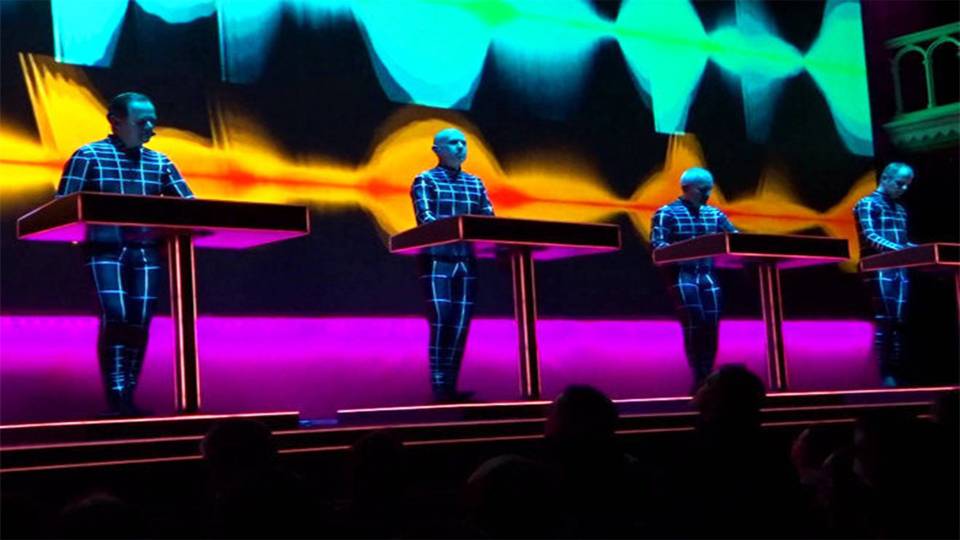Europe Endless: Kraftwerk on Tour in 2018
John Morgan, Counter-Currents, 2 March 2018
On Wednesday, February 21, I was fortunate enough to be able to see the landmark German band, Kraftwerk, in concert in Budapest, nearly twenty years after I first saw them perform in Detroit in June 1998, and thirteen years after I saw them for a second time, also in Detroit, in 2005.
It was a great experience, of course, although also a reminder of the fact that Kraftwerk has become more of a piece of music history than a living, evolving group of artists, given that they have released next to no new music in over thirty years. Indeed, their reputation rests entirely on six albums and one single that were released over a twelve-year period between 1974 and 1986.
[Snip]
Kraftwerk appealed to me on many levels. First of all, as I was already a Germanophile, Kraftwerk’s sound and aesthetic are extremely German (and, to a lesser extent, European) – everything from the lyrics to the style to their album covers screams extreme Germanness. There was also the fact that Kraftwerk have always been experts at treading the line between deadly seriousness and satire to the point where you’re not sure which is which – something which Laibach was to emulate, and take to much further extremes, in later years.
It was as well the sheer power and polished nature of their music – although apparently simple on the surface, it in fact consists of many layers of sound working seamlessly together, and each song, upon repeated hearings, shows clear signs of having been very carefully constructed and honed down to the last detail. In that, it resembled classical music more than the average pop song. And, of course, there is the fact of their extremely distinctive sound – very mechanical, and yet somehow still very human, and capable on occasion of stirring deep feelings.
There is also an almost child-like innocence to their aesthetic; in an age when most pop musicians seem to be in a contest to see who can be the most transgressive, Kraftwerk’s aesthetic, both musically and in presentation, has always been doggedly benign – one could indeed say, conservative.
Kraftwerk emerged as part of the rise of a new German musical culture in the late 1960s, just as a vibrant experimental music scene was beginning to take shape in West Germany in reaction to the dreadful state of German music at the time. Since the end of the Third Reich, West German popular music had been largely a product of the “Year Zero” of 1945, after which everything traditionally German had been cast under a pall of suspicion.
As a result, German pop music of the 1950s and ’60s was mostly vapid and vacuous, being either plastic imitations of British and American bands, even to the extent of singing in English and having English band names, or else came from the genre of schlager (hits) music, which consisted of syrupy-sweet sentimental lyrics laid atop very simple tunes.
By the late 1960s, however, a new generation of German musicians was rising which had been born too late to remember the horrors of the war, occupation, and denazification. These young musicians were often classically trained, but were also interested in rock from the Anglophone world, and they were looking to break new ground of their own, part of which was their desire to explore the possibilities of using electronics in making music. The British press mockingly dubbed this new genre “Krautrock” at the time, a label which stuck, but many of the bands that emerged from it went on to become legends: Amon Düül II, Ash Ra Tempel, Can, Cluster, Klaus Schulze, Neu!, Tangerine Dream, and my personal favorite (besides Kraftwerk), Popol Vuh, which composed several of the soundtracks for Werner Herzog’s early – and best – films. None was to attain the level of fame and influence that Kraftwerk were destined to reach, however.
Electronic music was something which was only just beginning to emerge in the 1960s as something more than just a curiosity for avant-garde composers, as it had been earlier in the twentieth century when musicians, including some of the Italian Futurists and Pierre Schaeffer, who developed music concrète in France, produced music by manipulating recorded sounds via electronics. The 1960s witnessed the rise of electronic musical instruments which could generate their own sounds – original sounds which cannot be produced in nature or by any classical instrument. These new devices included such instruments as the Moog synthesizer, the vocoder, and the drum machine.
Read the entire article at Counter-Currents.






















